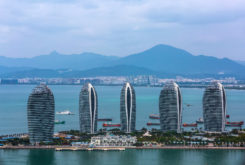The European Chamber of Commerce in China (ECC) has welcomed the lifting of restrictions for EU residents to return to China, but says important barriers remain, undermining european companies´ activity.
Since 28 March, China´s Ministry of Foreign Affairs (MFA) and the National Immigration Administration (NIA) suspended the ability for foreign nationals holding valid visas or residence permits to return to China, making these workers apply for a new visa at the Chinese embassy/consulate where they were currently residing, requiring an invitation letter from the provincial authority of their place of residence in China.
On 10 August, several Europe-based Chinese embassies published a notice on Visa Facilitation for Some Foreign Nationals with Valid Chinese Residence Permits (for working purposes, family reunions or personal matters), who may now apply for return visas, free of charge, at any Chinese embassy or consulate in these countries.
According to the ECC, a PU letter is no longer required for visa applications, but those applying for a visa under one of the various bilateral ‘fast-track’ agreements between China and countries will still need a PU letter.
Additionally, the ECC says, visa applications will be accepted based on both an applicant’s nationality as well as their current place of residence (both have to be on the list of 36 countries) and “only those with a current permit can apply for a return visa, which further excludes those whose valid documentation expired during the pandemic”.
“A common estimate finds that around 250,000 foreign experts remain stuck outside of China. With a quarter of aeroplane seats kept empty for social distancing, around 1,250 flights are needed to return them all – which would take around 16 weeks to accomplish under the current framework. Even if the regulatory framework is loosened to expedite their return, two key bottlenecks remain: the capacity to process visa applications at China’s embassies/consulates, and the number of flights going to China”, the Chamber adds.
According to ECC president Joerg Wuttke, despite “progress”, the remaining barriers should be “dismantled”, including expanding this policy to all overseas foreign nationals that work for ECC member companies.
“Greater clarity and swift follow-up to expedite the return of those still stranded overseas would help to stabilise the business sentiment, which has been in a downward spiral throughout 2020″, Wuttke added.
In a recent survey conducted by the Chamber’s Shanghai Chapter, 40 per cent of companies missing employees overseas report a drop in sales, and 30 per cent forecast decreased revenue.
“Under the current system, it will still take months to bring back all of the foreign experts that European firms in China rely on. The Chamber therefore calls for timely follow-up measures to the Notice, to build on the progress made”, the ECC says.
The Chamber calls for a “detailed and unified clarification of the policy, translated into key European languages, as the information so far published by various Chinese embassies has not been consistent”.
It also asks for this scheme to be expanded beyond just the European nationals currently residing in Europe to include all personnel that work for European companies based in China, regardless of their nationality or where they currently reside.
Another issue are international schools in China, with around 4,000 teachers and their dependents needing to return promptly for these to run classes sustainably.
“While an important step, the remaining barriers are still too great for this to completely mitigate the significant impacts on business operations in China”, the ECC says.
On 6 July, ECC President Wuttke wrote a second letter to Foreign Affairs Minister Wang Yi, requesting assistance to facilitate the return of foreign residents to China with a particular focus on teachers of international schools, small-and-medium-sized enterprises (SMEs) employees, and their dependents.




